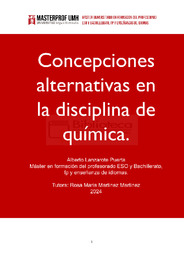Please use this identifier to cite or link to this item:
https://hdl.handle.net/11000/33139Full metadata record
| DC Field | Value | Language |
|---|---|---|
| dc.contributor.advisor | Martínez Martínez, Rosa María | - |
| dc.contributor.author | Lanzarote Puerta, Alberto | - |
| dc.date.accessioned | 2024-09-16T10:42:17Z | - |
| dc.date.available | 2024-09-16T10:42:17Z | - |
| dc.date.created | 2024-06 | - |
| dc.identifier.uri | https://hdl.handle.net/11000/33139 | - |
| dc.description | Especialidad: Física y Química | es_ES |
| dc.description.abstract | La didáctica de la física y la química ha evolucionado a lo largo de los años gracias en parte a la investigación de los docentes en la forma de asimilación de conceptos de los estudiantes y el conocimiento de las ideas previas con las que cuentan. La creación del concepto mental en los estudiantes está influido por estas ideas previas, las cuales los alumnos extraen de su entorno o experiencias a lo largo de sus vidas, no siempre estas ideas son las correctas, entonces hablamos de ideas o concepciones alternativas, las cuales suponen un reto para los docentes, ya que lograr transformar estas concepciones alternativas en el concepto científico puede ser una tarea difícil. Por ello en este trabajo se realizó una revisión bibliográfica a diversos artículos de repercusión notable, especializados en identificar estas concepciones alternativas y realizar propuestas de cómo modificarlas. Los artículos en su mayoría eran de lengua hispano hablante, tanto españoles como sudamericanos. Finalmente se realizó una propuesta para mejorar esta capacidad de los docentes de identificar las concepciones alternativas de los estudiantes y una serie de consejos para poder eliminarlas y transmitir los conocimientos de manera sencilla y directa | es_ES |
| dc.description.abstract | The didactics of physics and chemistry has evolved over the years, thanks in part to teachers' research into the way students assimilate concepts and the knowledge of the prior ideas they have. The creation of the mental concept in students is influenced by these previous ideas that students extract from their environment or experiences throughout their lives, not always these ideas are correct, then we talk about ideas or alternative conceptions, which pose a challenge to teachers because achieving the transformation of these alternative conceptions into the scientific concept can be a difficult task. For this reason, in this paper we have carried out a literature review of several articles of note that have specialized in identifying these alternative conceptions and making proposals for their modification. Most of the articles were Spanish-speaking, both Spanish and South American. Finally, a proposal was made to improve teachers' ability to identify students' alternative conceptions and a series of tips to eliminate them and transmit knowledge in a simple and direct way | es_ES |
| dc.format | application/pdf | es_ES |
| dc.format.extent | 23 | es_ES |
| dc.language.iso | spa | es_ES |
| dc.publisher | Universidad Miguel Hernández | es_ES |
| dc.rights | info:eu-repo/semantics/openAccess | es_ES |
| dc.rights.uri | http://creativecommons.org/licenses/by-nc-nd/4.0/ | * |
| dc.subject | Asimilación de conceptos | es_ES |
| dc.subject | Concepto científico | es_ES |
| dc.subject | Didáctica | es_ES |
| dc.subject.other | CDU::3 - Ciencias sociales::37 - Educación. Enseñanza. Formación. Tiempo libre | es_ES |
| dc.title | Concepciones alternativas en la disciplina de química | es_ES |
| dc.type | info:eu-repo/semantics/masterThesis | es_ES |

View/Open:
TFM Lanzarote Puerta, Alberto.pdf
392,85 kB
Adobe PDF
Share:
.png)
